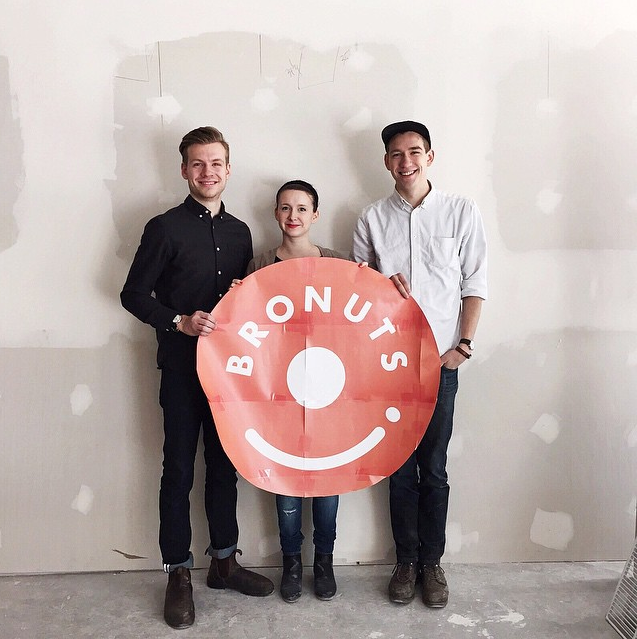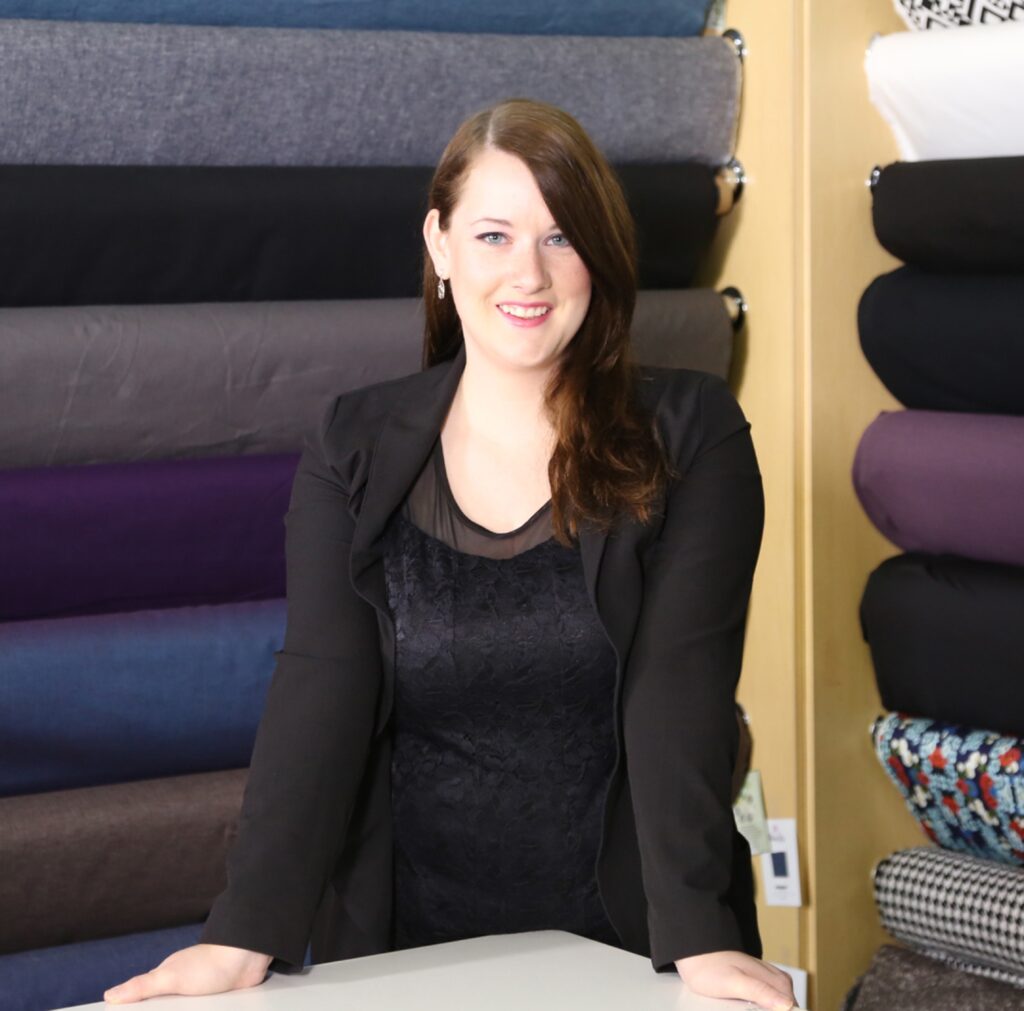22 Canadian Entrepreneurs Represent Canada at the G20 YEA Summit in Istanbul
The G20 Young Entrepreneurs’ Alliance (G20 YEA) is a global network of young entrepreneurs and the organizations that support them. It was established to convene each year in advance of the G-20 Summit, with the aim of championing the importance of young entrepreneurs to the G20 member nations and to share examples and practices. The Alliance was officially created at the G20 Young Entrepreneurs Summit, Toronto, Canada, 2010. This year the G20 YEA Summit is being held in Istanbul, Turkey.
As the official G20 YEA member for our country, Futurpreneur Canada reviewed over 60 applications from Canadians passionate about entrepreneurship and the opportunity to join the 2015 Canadian delegation. After a round of interviews, a panel of judges selected 22 entrepreneurs to represent their country on the international stage. The Canadian delegates will travel to Turkey this September to engage the G20 leaders and policymakers in the cause of youth entrepreneurship and to meet and network with over 600 entrepreneurs from around the globe. Meet the 2015 delegation below!

Alexandre Fainberg (Montreal, Quebec)
Company: Heddoko
Motto: “Hope is not a strategy.”
Profile

Alexandre Mensi (Laval, Quebec)
Company: Mango Software Inc.
Motto: “Do the right thing, do the thing right!”
Profile

Arielle Beaudin (Montreal, Quebec)
Company: LORI.biz
Motto: “Do it right.”
Profile

Barry Hartman (Vancouver, British Columbia)
Company: 505-Junk
Motto: “Challenge is the first step of opportunity.”
Profile

Bassil Silim Jones (Montreal, Quebec)
Company: Merchlar
Motto: “My father used to tell me to “crack your butt and work hard now not later”. This is what I now know as the power of delayed gratification. Success usually comes down to choosing the pain of discipline over the ease of distraction. And that’s exactly what delayed gratification is all about.”
Profile

Daniel Dubois (Vancouver, British Columbia)
Company: ShareShed
Motto: “Win the day.”
Profile

Déborah Cherenfant (Montreal, Quebec)
Company: Mots d’Elles Media
Motto: “Always aim higher.”
Profile

Devon Fiddler (Saskatoon, Saskatchewan)
Company: SheNative Goods Inc.
Motto: “She believed she could so she did.”
Profile
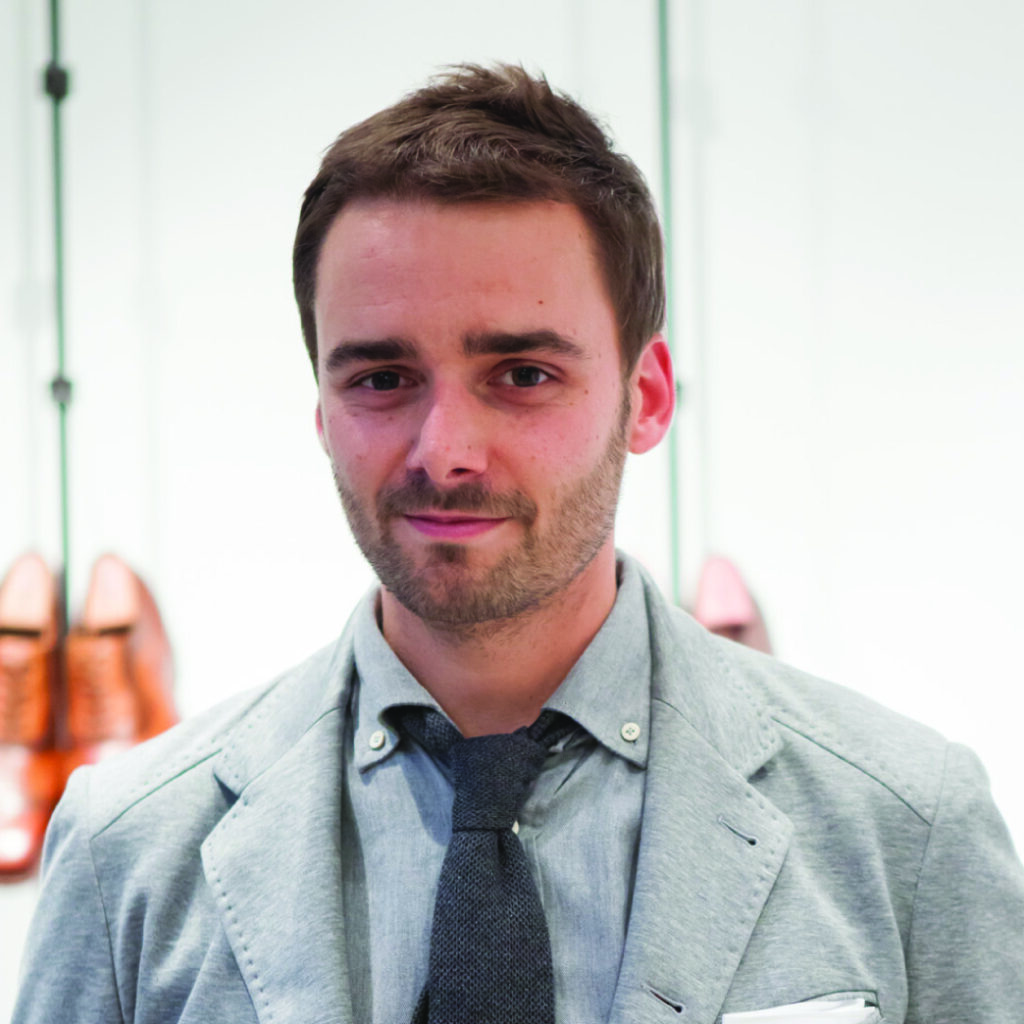
Felix Marzell (Montreal, Quebec)
Company: DIX au carré
Motto: “You play, you discover. You discover, you innovate.”
Profile

Heather Abbey (Saskatoon, Saskatchewan)
Company: ShopIndig.ca
Motto: “I’m not scared of failure, but I am of regret.”
Profile

Humeyra Ayshé Karsli (Montreal, Quebec)
Company: Atlantic Trade Bridge
Motto: “I have no idols; I admire hard work, dedication and competence.”
Profile

Ibrahim “Obby” Khan (Winnipeg, Manitoba)
Company: Shawarma Khan & Green Carrot
Motto: “Entrepreneurship is living a few years of your life like most people won’t so that you can live the rest of your life like most people can’t.”
Profile

JP Dejardins (Montreal, Quebec)
Company: The Wallrus & Orangerine
Motto: “You are what you do.”
Profile

Leslie Gallagher (Halifax, Nova Scotia)
Company: WorkLocal.jobs
Motto: “Follow up & follow through.”
Profile

Luc Bohunicky (Winnipeg, Manitoba)
Company: Consultica
Motto: “What would you do if you knew you could not fail?”
Profile

Manny Padda (Vancouver, British Columbia)
Company: New Avenue Capital
Motto: “Invest in the person/entrepreneur.”
Profile

Ray Walia (Vancouver, British Columbia)
Company: Launch Academy
Motto: “Everybody has something to teach, everybody has something to learn.”
Profile

Sarah Segal (Montreal, Quebec)
Company: SQUISH
Motto: “It takes 10 years to be an overnight success.”
Profile

Scott Henry (Windsor, Ontario)
Company: Kidogo
Motto: ”If you want to go fast, go alone, if you want to go far, go together.”
Profile

Scott Walton (Saint John, New Brunswick)
Company: Enovex/Covalent
Motto: “If you want money ask for advice, if you want advice ask for money.”
Profile

Stephanie Brisson (Montreal, Quebec)
Company: Credo Productions
Motto: “Make it happen.”
Profile

Winston Chan (Montreal, Quebec)
Company: Dr. Winston Chan Wellness Chiropractic
Motto: “Just do it.”
Profile
Delegates will be accompanied by the following members of the Futurpreneur Canada team:

Cindy Goertzen (Winnipeg, Manitoba)
Board Member, Futurpreneur Canada
Profile

Marsha Josephs (Richmond Hill, Ontario)
VP, Corporate and Public Affairs, Futurpreneur Canada and G20 YEA Canadian Sherpa
Profile

Olivier Letard (Montreal, Quebec)
Board Member, Futurpreneur Canada and G20 YEA Canadian President
Profile
Tips for Balancing Your New Business and a Full-time Job (Part 3)

Photo Credit: www.forbes.com
Part 3: The Power of Re-commitment
This is the last of a three part series on working a full-time job and starting a business. You can find part one here or part two here.
Imagine for a moment you hold a full-time job and in the last four months you’ve launched a part-time business. You were excited when you started, but lately you’re feeling tired after work, in the last two to three weeks you haven’t done much and your productivity has come to a halt.
Now what?
Old self
Realize that your old self is rebelling, as it wants to keep the status quo—after all you are breaking into a new way of living and thinking. You are being tested. Do you really want this? By its very nature working full-time and starting a business is a series of stumble, fall, get up, start again, stumble, fall, get up, etc. Each day is a new day, commit to starting, or re-starting.
Break down your goals
The key is to break down your larger goals into its smallest units. Success comes in small increments—do not get fooled in believing success happens overnight (especially if you believe you have a great idea). A wonderful book that extolls this principle is The Compound Effect by Darren Hardy. In essence, one drop in the bucket each day adds up to a full bucket, or a successful business in the long run.
Consistency wins
All the goals in the world won’t matter if you don’t develop healthy habits. Create the right space (see part one on the Harmony Schedule). The right environment starts with consistency – setting a schedule and sticking to it. Studies show when you schedule a task at a certain time in the day you’re more likely to do it than if you do it when you “feel like it”.
Compassionate Objectivity
Let’s go back to that example in the beginning where in the last two weeks you haven’t done much on your business. Some will be hard on themselves (“I’m not cut out for this,” or, “I’m dumb with numbers). Others will find excuses with their circumstances (“I had a rough week, too much is happening”).
I really like what Hillary Rettig has to say about handling times like these by using Compassionate Objectivity. Compassionately objective people forgo unproductive blame and shame, but that doesn’t mean they don’t take responsibility. In the compassionately objective response, one doesn’t belittle oneself. The focus remains on the areas one can improve – and not labelling oneself or giving up one’s power to circumstances.
For example you can re-examine last week when you come home tired. You can look at what transpired – you made dinner late, had a glass of wine and decided to watch a relaxing show only to realize it was already 10:30pm. You can then rewind and say you actually needed a break, instead of telling yourself you were lazy, and in the future you will set up a time for both the work you will do and a break afterwards. You can decide to schedule on Thursday at 7:30pm you’ll email your suppliers and at 9:00pm you’ll watch your favourite show. Do everything in your power to start the task on time. Your motivation can come after you start the task, knowing you’ll be rewarded later that evening.
These are small shifts, but in the long run they add up. If you work full-time and have already started a business part-time, I wish you continued moments of growth, insight and action. If this is something you are contemplating, I hope you can see that you have the power to make it happen.
If you need help in getting you set in the right direction check out our free Business Plan Writer.
Written By: Dominik Loncar, Futurpreneur Canada Entrepreneur-in-Residence, dloncar@futurpreneur.ca
Spotlight on Lightenco: Sometimes Timing is Everything
Steve Hubbard and Raymundo de Cojo are the co-owners of Lightenco, a company offering retrofit lighting solutions that help businesses reduce hydro costs and cut down on energy consumption. These self-professed “lighting geeks” design solutions using LED lights, which contain no mercury, emit no UV/IR light, give off less heat than other bulbs and last more than 50,000 hours. In addition to saving businesses a lot of money, Lightenco also ensures the old lights they replace are properly recycled to protect the environment. The company has Canadian operations in Ontario and Québec, and also in Mexico, where it manufactures LED products for public, industrial and commercial use.
Steve and Raymundo are successful entrepreneurs who have launched a start-up through Futurpreneur, so of course we were excited to find out some of their secrets. I interviewed Steve to learn more about his foray into entrepreneurship, and what I heard was a great story about the importance of timing, market awareness and putting the customer at the heart of your business.
It’s all about timing
It all started when the two entrepreneurs were introduced through their wives, who were close friends from the same town in Mexico. Steve and his wife were living in Ottawa at the time, while Raymundo and his wife still lived in Mexico. Little did they know that this introduction would lead to a friendship, and then later to a fruitful business relationship.
In 2008 Steve moved to Ottawa to pursue a career in politics, and, by chance, ended up becoming an entrepreneur instead. After seeing his wife’s experience trying to keep in touch with people back in Mexico while living in Canada, Steve saw a need for an economical long distance calling solution for people living abroad who wanted to keep in close contact with loved ones at home. He started CampusCom, a VoIP phone company aimed at expats and international students.
Shortly afterwards, Raymundo and his wife moved to Canada and Steve saw an opportunity to bring him into the business, which would benefit from his engineering background. The venture enjoyed some success, but after that they were both hooked on the rush that comes from building a business. It wasn’t long before they were on to the next big idea. Raymundo and a fellow engineer from Mexico, Eduardo Vargas, started working on launching a new company that would offer turnkey LED lighting solutions and they asked Steve to join in a sales and marketing capacity. The timing was perfect for such a venture, as the Ontario and Québec governments had launched a series of energy conservation incentives for businesses, creating a new market demand for the solutions Lightenco would provide.
Know your market
Taking stock—and advantage—of developments in the market, such as a government incentive or a trend toward environmental awareness, is the first lesson in good entrepreneurship that we can take away from Lightenco’s success. As Steve advises, “A lot of time should be taken researching your business. Support is offered by many levels of government and private organizations to help you.”
When asked what steps he,Raymundo and Eduardo took to better understand the market, Steve talked about the different resources and partnerships that they found helpful. For one thing, they entered some competitions, which usually involved pitching to a panel, Dragon’s Den-style. They ended up getting a lot of helpful information from the experts on these panels that helped them develop and strengthen their business. For example, they were told that they had a great business model, but they needed to consider how they would ensure its sustainability so it wouldn’t be entirely reliant on government subsidies that could be changed or discontinued.
They also reached out to local organizations such as Invest Ottawa and CDEC in Montréal to find programs that would help them grow the business. Steve also credits their use of co-working spaces as extremely beneficial, surrounding them with a community of independent consultants and entrepreneurs with varied experiences and skill sets. Collaboration is another theme that runs through the Lightenco story, as a solid way to test your business model and learn about your market.
Steve says, “If you’re on your own and can join a community like HUB or CSI, the benefits are considerable. Get involved and meet fellow entrepreneurs to share business ideas and find opportunities to help each other grow.”
Put the customer first
A big part of what makes Steve, Raymundo and Eduardo true entrepreneurs is how their business ideas, from CampusCom to Lightenco, are born from customer need. Rather than setting out to sell a particular product and convince would-be customers that they need it, their approach is to design products that they know customers need and want. They pay close attention to holes in the market and then go to work creating products and services that will provide the perfect solution.
For example, when they created Lightenco to capitalize on the increased interest in LED lighting due to the government incentives, they set out to create turnkey lighting solutions that would truly improve on existing technology. Lightenco products offer customers efficiency, performance and environmental friendliness, a combination that wasn’t being found with other lighting technologies. Together these factors built a strong business case for the success of Lightenco in Canada.
Advice for aspiring start-up founders
“Bootstrap—there’s no need to bite off more than you can chew and every dollar counts. Many fixed costs can be significantly reduced by seeking alternative and sometimes temporary solutions. Modernize—take advantage of social media tools like Twitter, Facebook, LinkedIn and Hootsuite. There are many examples of existing business that fail as a result of not modernizing. Be confident—attitude often outweighs aptitude!”
Lightenco was recently featured on CBC and CTV. Follow Lightenco on Facebook and Twitter.
Written By: Kristin Knapp, Content Copywriter, Futurpreneur Canada
Spotlight On Bronuts: When Bros Meet Donuts
Sometimes you find inspiration in the most unexpected places and at the most unexpected times, and that’s exactly what happened when the idea of Bronuts came to be. Co-owner, Brett Zahari and his wife (now business partner), Meghan were on a road trip to Portland in the summer of 2014 when they kept stumbling upon gourmet donut shops. Falling completely in love with the idea of fresh gourmet donuts every day, and being slightly heartbroken that upon their return back to Winnipeg, they would have to say goodbye to them, Brett realized that Winnipeg needed its own gourmet donut shop.
When Meghan and Brett returned from their trip, they shared the idea with Brett’s brother, Dylan. At first, everybody involved was hesitant, but after some brainstorming, number-crunching, and the suggestion of the name “Bronuts,” the team felt that this was a viable idea and something worth pursuing. Once they found the perfect spot for their shop, with the help of their father, who is a contractor, Dylan, Brett and Meghan spent their days and nights, on top of their regular careers doing construction, to turn their dream into reality.
Now serving up delicious donut creations from peanut butter and chocolate, to a new special summer donut, lemon poppy seed, Bronuts is quickly growing. Meghan, Dylan and Brett are constantly being challenged each day as entrepreneurs. When asked what a typical day looks like for the three of them, Meghan explained that the answer today will be entirely different from tomorrow, but there is one thing she can always count on each week—Costco runs. “I can’t say I thought I’d ever need to run to Costco in a panic to buy 18 jugs of milk multiple times a week.”In addition to leading the hectic, yet rewarding, lives of entrepreneurs, being in business with family has a great balance of being challenging and awesome, Brett shared. Brett and Dylan grew up as not just brothers, but best friends. “We know how to work with each other, and how to annoy each other,” Brett explained. “There’s a real balance of trying to make sure that everyone’s ideas were considered equally and we all felt good about what we were building together.”
It’s evident that family and food are the top priorities for Bronuts. “It was family that built the place, it’s family-run, our staff get along so well and have become a little family, and families are often the ones filing our tables all day,” Brett shared. Meghan explained that the team works really well together and each of their strengths supports each other’s weaknesses. Brett handles the numbers and the coffee, Dylan handles the kitchen and the donuts, and Meghan looks after the staff and social media.

Photographed above Brett and Meghan’s baby supporting the family business.
The powerful family trio has advice for entrepreneurs wanting to get into business with their families: “Don’t do it because ‘it will be so fun!’. Be realistic and intentional all the way through. It’s one of the most incredible experiences, but it takes work. Communicate. Don’t let things sit and fester. Just keep talking and always remember that your disagreements within the business don’t reflect on your personal relationship. That’s probably the coolest thing about working with family—no matter what happens, you know you have that family bond at the end of the day.”
Written By: Lauren Marinigh, Social Media & Content Creation Coordinator, Futurpreneur Canada
Futurpreneur Entrepreneurs Celebrate Canada Day
It’s Canada Day and we’re celebrating all the entrepreneurs who are helping to build a strong future for this wonderful country we call home! We asked a few of our “Futurpreneurs” to give us their opinions on entrepreneurship in Canada and why it is so important to our country.

“Young entrepreneurs are not only crucial for the future of Canada, but the world. Entrepreneurs are problem solvers—and there is no shortage of crucial and urgent problems that the world needs solving. Everything from climate change, to simply improving our quality of life, young innovative Canadian entrepreneurs are what will drive our economy and keep Canada strong and competitive. With emerging economies around the world, we can’t simply rely on natural resources or production to be a primary source of economic activity. Instead young entrepreneurs are working hard to create businesses that rely on innovation as their main output, and in doing so they are building and creating the jobs for our future economy.”
– Denny Hollick, Orangedox (Vancouver, British Columbia)
“I think entrepreneurship in Canada is a give and take relationship. Not only do we, as entrepreneurs help make a stronger Canada but Canada also makes us stronger entrepreneurs by allowing us the freedom to create—freedom of thought, speech and to pursue our passions; to let us do what we really want. In all our inventive and quirky ways we can give back to our communities in a context that is both personal to us and beneficial to the diverse world we live in.”
– Kate Matheson, Eat and Thrive Meal Planning Co. (Toronto, Ontario)
“Young Entrepreneurs are changing the way that we look at life, and changing the way we make a living. Young entrepreneurs are collaborating with other young like-minded entrepreneurs rather than competing. We are also using our livelihood to make social change and by doing something bigger than ourselves. We are building a stronger Canada by using our passions to help build up other people. We are creating jobs, we are creating new exciting products and bringing production home to our communities. We are supporting local economies and other local businesses, community owned restaurants, shops and brands.”
– Devon Fiddler, SheNative (Saskatoon, Saskatchewan)
“Young entrepreneurs are building a stronger Canada through the experience they gain. Skills like management, marketing and more importantly, making a business sustainable, are things that you don’t learn in school. Being able to think like an entrepreneur is a handy weapon that’s highly valued. For these reasons, Canada is becoming a stronger, diverse, and more vibrant country with more potential each day someone decides to be an entrepreneur and does it successfully.”
– Andrew Oh, Mint Ultimate (Etobicoke, Ontario)
“Entrepreneurs are innovative, creative and forward-thinking. However, in order to build a stronger Canada we need to focus on exporting. Since the Canadian market is relatively small, any product or servicing business that is highly specialized must export outside of Canada. The objective is to keep production in Canada, increase the amount of sales offices in bigger foreign markets and drive the money back into Canada. Increasing high paying jobs in Canada and keeping our talent locally are the keys to keeping Canada a healthy business leader.”
– Awane Jones, Merchlar (Montreal, Quebec)
“Young entrepreneurs have drive, vision, and focus, they bring creative ideas to the communities they live in, which helps to diversify and support those communities. Consumers who support and buy products from young entrepreneurs are, in turn, supporting and strengthening their local economies. Specifically, young entrepreneurs create jobs for their own employees, and support local businesses and tradespeople through networking and business transactions. From the graphic designer who made their logo to the company who installed their sign, entrepreneurs are part of the lifeblood of their local economies. By supporting the young entrepreneurs in your area, you are helping to keep your community and county thriving.”
– Erin Kirby, Fiberlilly (St. John’s, Newfoundland)
“Young Canadian entrepreneurs bring new ideas to the marketplace. Their commitment, enthusiasm, and willingness to take risks make them the kind of people our country needs to remain competitive in the global marketplace. They inspire other young people to chase their dreams and are the future of a strong and vibrant Canada.”
– Alex Ethans, Eph Apparel (Winnipeg, Manitoba)
“Motivated by their passion, today’s young entrepreneurs need to be bold, creative, have a vision and think independently. More commonly now than ever, young entrepreneurs are thinking green and outside the box. The interests of our communities and sustainable, green business models seem to be at the forefront of our endeavors. Personally, I think this is a huge and much needed step in the right direction. We look to the future and I believe with the right support and motivations, today’s young entrepreneurs can lead Canada into a brighter future. Today’s young entrepreneurs are less motivated by a quick buck or easy living. They want a challenge and desire to better the world around them. They set a goal and rise to meet it. One successful young entrepreneur can inspire many to set and achieve their goals as well and Canada as a nation can only become stronger with inspired youth.”
– Jana Furness, The Juice Box Café (Montague, Prince Edward Island)
“We’re always working to build our community. Our community operates as a part of the bigger picture of our national community. In today’s world, ideas spread and grow rapidly. From one community or city or province to another. For example; when we first launched our business, we were the first cold pressed juice bar in Canada. Now there are close to 100 Cold Pressed Juice Bars across the nation. The idea starts somewhere and it grows and changes and evolves and now collectively, whether intentionally or not, we are all working collectively to grow health and wellness and have a positive impact on plant based agriculture. The more we can support plant based agriculture the bigger impact we have on the environmental issues surrounding agriculture. On another side, we create jobs and opportunities and an open mind to help spring board the next generation of young entrepreneurs. “
– Zach Berman, The Juice Truck (Vancouver, BC)
“As Canada’s emerging workforce enters the job scene, more young Canadians are moving towards an entrepreneurial path of generating their own employment, than relying on traditionally unstable employment. This is generating a win win scenario for Canada’s economy. Traditional job markets are continuing with youthful entrepreneurs driving them, innovative ideas are sparking growth in new areas and in turn, ultimately strengthening the Canadian economy, making a better Canada.”
– Barbara McLean-Stollery, Executive Airways Grooming (Alberta)
Thyme to Dine: A Recipe for Business Success
By her own admission, Jennifer Wellsman had long dreamed of owning her own business, but there was one issue, she didn’t know what type of business she wanted to start. When one of Jennifer’s friends who was busy launching her own business admitted that she would like to have a personal chef because she didn’t have time to cook, Jennifer saw an opportunity. The idea matured and after three years, Jennifer transformed herself into a personal chef and Thyme to Dine was born. Now she is both CEO and head chef, an uncommon combination. We asked Jennifer some questions to learn more about Thyme to Dine and Jennifer’s daily life as an entrepreneur.
Could you tell us more about your activities with Thyme to Dine?
I am a personal chef. I provide my clients with healthy meals to enjoy at the end of a busy day. For the most part, my clients are families with two parents who work and where the kids have extra-curricular activities. I also work with couples and single people who are active professionals, but I also prepare meals for seniors. I am based in Saint John in Newfoundland-Labrador. The economy is good, and there are many professionals who are busier than ever and making a good income. They want to eat healthy foods but they lack time. So, there is a real need for the service I’ve proposed with Thyme to Dine.
How does your service benefit your clients?
I save people time and money. In our busy lives, people are looking for ways to save time so that they can focus on what they really want to do with their time. They don’t have time to cook but they also don’t want to be going through the drive-through getting unhealthy meals for their family. They want to be eating healthy meals. Meals they wish they could be making themselves if they had time. I provide those healthy meals. I save time by menu planning, grocery shopping, cooking, packaging and labeling the meals with reheating instructions. My clients put them in their freezer and on those busy days, they take one out, defrost it and heat it up.
How do you work with your clients?
The way my business works is that I meet with clients, discuss their dietary needs and set up the details for me to come to their homes and cook. I then develop a menu of five recipes unique to them that will yield 10 meals for the client. Each meal is large enough to feed their families, and they have the option to change the menu if there is something they don’t like. On the cook day I prepare the meals using fresh ingredients. I then package and label the food with reheating instructions.
What benefits and challenges have you faced being an entrepreneur?
I love being my own boss. Making decisions and having the freedom to manage my time the way I want is great. On the other hand, I am confronted with new difficulties. I have to devote time to marketing activities in order to find new clients and grow my business. I don’t know from month-to-month how many clients I’ll have. It’s all a question of making my services known to ensure that my client bookings are full each month.
How do you market your services?
I realized that new clients would not come to me—I have to go out and find them. The networking forces me to get out of my comfort zone, but I know it’s essential if I want to increase my visibility. I also took a course to help me gain the confidence I need to meet people. Today, networking is one of the activities I take on with pleasure. I am a member of many business groups comprised of women. We meet every month and learn a lot about female entrepreneurs. We talk about our businesses, the challenges we face, and the highs and lows. That’s very beneficial because we encourage and help each other. I hope to be able to employ others in the near future.
Interview conducted by: Claire Gendron, Bilingual Marketing Content Coordinator, Futurpreneur Canada
Spotlight on FarmLead: Planting the Seeds for a Successful Business
When Brennan Turner turned to entrepreneurship as a career option, he used his extensive knowledge of farming to identify a gap in the agricultural market and to create a tool that would change how farmers buy and sell product. His secret weapons: firsthand knowledge of the farming business and extensive market research.
Having a business idea is often the first steps to becoming an entrepreneur, but identifying if your idea is start-up ready is likely the most important step. One of the biggest pieces of advice Futurpreneur Brennan Turner would give potential entrepreneurs is to understand and test their market as much as possible, rather than playing what he calls the “if you build it, they will come” game. That’s exactly what he did when starting his business, FarmLead.
Brennan is originally from small-town Saskatchewan, and before turning to entrepreneurship he worked on Wall Street and played professional hockey. He eventually decided to return back home to help manage his family’s farm business operations more efficiently and effectively.
While working on his family’s business, Brennan saw a gap in the market when it came to how farmers buy and sell products. “Farmers are at the center of a year-round cycle of buying crop inputs of seeds, chemicals and fertilizer, and then selling their production,” Brennan told Futurpreneur. He saw that the process farmers used for buying inputs and selling crops relied on phone calls and face-to-face meeting, which often resulted in biased negotiations, a struggle to find resources and a lot of frustration with an inefficient process. “Without a tool or process to optimize farm business, the reality is that farmers would continue to make deals that were likely not the best possible option,” Brennan explained.
This is where he came up with the idea of FarmLead, a free online marketplace that connects grains sellers with buyers. With the mobile application, users can buy grains, negotiate price and make a counter-offer, anytime, anywhere. Whether they are sellers or buyers, with FarmLead they are able to reach more potential buyers or sellers than if they were making deal by phone.
Brennan’s personal experience formed the basis for his research. He understood the process of buying and selling in the farming businesses, and what this means for farmers. “It’s a year-round, time consuming process that depends on many factors, including trying to get the best price, covering our risk, managing our cash, and adjusting for unknowns – namely weather, and international market effects.”
Brennan didn’t just rely on this experience, though, and also undertook intensive research that included market surveys of farmers and industry players, data analytics and general strategy development.
Understanding the market is also a daily component of running FarmLead. Brennen writes a grains market commentary called the Breakfast Brief on an almost daily basis, giving his perspective on the global grains market so that the farmers can get a big-picture view of what’s going on in their industry. His Breakfast Brief is clearly working – almost 7,000 farmers around the world read it every day.
The result of all his research and hard work? “We are currently the uncontested platform for farm ecommerce,” said Brennan. The company was also recently named one of Canada’s Top 15 Start-Ups, selected from a list of nationwide applicants representing Canada’s most promising technology start-up companies.
More research is in the plan for FarmLead to help meet their goals of expanding into new farm business verticals, new farm business support services, and new geographies. “We have a first-mover advantage right now and our goal is to maintain our position as the market leader through continuous innovation, superior user experience and customer support.”
Aside from helping him grown a successful business, Brennan knows his knowledge of the industry and research is paying off because FarmLead is helping farmers. “We’re helping producers find 3-5% more for their bottom line, equating to more dollars in their bank account and more residual business for small-town, rural communities, which have many businesses and entrepreneurs who are dependent on farmers.”
Written by: Meghan Paton, Manager, Public Relations and Social Media
Developing a Vision for Your Business
Before you set out to develop a vision for your business, it is important to understand why you want to start your business in the first place. Why do you want to be an entrepreneur? Why are you choosing the industry that you have chosen? Why did you decide on a specific service or product offering? Starting with the understanding of why you are in business will allow you to clearly communicate your company’s story and help you develop your vision.
Start With Why
In the words of Simon Sinek, author of Start With Why, “People don’t buy what you do; they buy why you do it and what you do simply proves what you believe.” Understanding the “why” prior to writing your vision will help you clarify your overall picture that doesn’t yet exist. Having a clear purpose will also make you feel excited when you are writing your vision, which is essential when you’re trying to clearly visualize the future of your company and inspire your stakeholders (employees, clients, investors, etc.).
Get out of your house or your office
The last place you want to be is in your house or in your office when writing your vision. You want to think outside of the box (pun intended) to allow your creative juices to start flowing without the distractions of your day to day life or business. Removing yourself from these distractions will allow you to think 3, 5, and 20 years ahead without all of the mental blocks and barriers that are trying to say, “you can’t do it.” You can do it, because now more than ever, we are in a society of endless opportunity where we can leverage smarter people, smarter technology, and smarter governments to help support us on our entrepreneurial journey.
Forget about how you will implement your vision
Make your vision as large as you can imagine and work backwards from there. From a business model perspective, chances are you started your business because you either want to capitalize on a first-in advantage or you want to offer an improved product or service in comparison to the competition. Regardless of your model, your vision must clearly explain where you want to be in the future with little to no explanation as to how you want to get there.
As a general rule of thumb, I like to break it down as follows:
- 5-20 years out: a few paragraphs explaining what your vision for your company is in 5, 10, and 20 years. This can be used as a guideline to keep you on track when making strategic decisions.
- 3 years out: this will vary by the industry, but you should write your thoughts down on what your company looks like in three years. Consider asking yourself these questions:
– What are your core values?
– Do we have an office? What does it look like?
– What positions have been hired for in the company?
– How much revenue are you doing?
– How much of that is profit?
– Who are our ideal clients?
– What territories are we operating in? If your business is online, what is the scope of the distribution online?- – What awards have you won?
– How much money do you have in the bank?
Try to break it down using the different business areas in your company including leadership, operations, human resources, money, and sales/marketing. This will give you a sense of vision for all areas of business, and not just the exciting opportunities or areas that you as an entrepreneur specialize in.
Don’t be afraid to share your vision
Never be afraid to share your vision. At 505-Junk, we encourage our employees to talk about our vision with their friends and family to build excitement around the brand. Print your vision, share it with everybody, and you will be surprised at how inspired people are to help you fulfill that vision. Give the stakeholders in your company something to talk about so they start selling your brand for you. Leverage the internet by capitalizing on great platforms on social media so people can start the discussion without you having to be around. Build the excitement and let the people do the talking!
Written by: Barry Harman, Co-Founder & CEO, 505-Junk
Tips for Balancing Your New Business and a Full-time Job (Part 2)

Part 2: Internal Conversations that Sabotage Our Efforts
In part 1, I looked at developing a Harmony Schedule for balancing your new business with a full-time job. In this blog, I examine one of the biggest obstacles in starting a business while holding a full time job; it has nothing to do with financial statements, but has everything to do with what we tell ourselves.
I come home from a long day at work and then sit in front of the computer ready to write a marketing plan. My internal dialogue tells me, “relax, take it easy, you earned it.” Two hours later, all I’ve accomplished are looking at deals for a trip I’m planning to Budapest.
I can justify this action as “I just didn’t feel like doing my marketing plan.” After all, I set my schedule and as a budding entrepreneur, I can decide when I do something, can’t I? Leo Babauta, in his blog, Zen Habits, says that mood is a poor indicator of whether you should do something. Doing whatever you feel like is not what it means to run a business. I would argue that the most successful entrepreneurs are those who pushed past their comfort zone.
When we start to pay attention to our internal dialogue, we see that it is not always walking in the same direction we are. Here are typical self-talks we have with ourselves and ways to re-focus and stay motivated:
Internal conversation: “I’m not good at cash flow or with numbers.” Response: “All I have to do is take the first small step. Once I start, I’ll be glad I did. Who says it needs to be perfect?”
Internal conversation: “Just this once won’t hurt.” Response: “Yes, ‘just this once’ does hurt. Let’s not fall for our old thinking traps.”
Internal conversation: “I need to take it easy:” Response: “Right now I need to stay focused. I have been presented with a great opportunity and a great idea.”
Internal conversation: “I need a break:” Response: “I need a short break. I’ll give myself 15 minutes to go and grab a snack, then get back to work – wonderful projects await me.”
Of course our bodies and minds do need breaks. In my experience one of the biggest reasons we sabotage our efforts is because we have nothing to look forward to during the week. Your body and mind need rejuvenation and inspirational breaks. These breaks don’t have to be long but knowing they have been scheduled ahead of time will allow you realize that a reward awaits you when you accomplish something that you consider a challenge. You are developing new habits.
See my blog post on the Harmony Schedule to give you a better understanding on how to create a system that will minimize feeling overwhelmed.
Think of it this way – if my internal conversation is telling me to take it easy, I can rebuff it in a way that is compassionate but only if I have scheduled time to rejuvenate during the week. I can remind “it” that I did plan for fun and down time. But if I haven’t, I will eventually sabotage my efforts because “it” knows I’m cheating.
Hope and sabotage are two sides of the same coin. In part three I will discuss what to do when things have slowed down or even come to a halt: The Power of Recommitment.
Written By: Dominik Loncar, Futurpreneur Canada Entrepreneur-in-Residence, dloncar@futurpreneur.ca
Read part three of this series here.
Creating Conversations around Mental Health through Stylish Clothing
Being socially conscious but also creative is a philosophy that Kyle MacNevin and Kayley Reed of Wear Your Label hold firmly. This was something that was always top of mind while developing Wear Your Label, a clothing line that was developed with the goal to create conversations around mental health and ultimately end the stigma surrounding it. Kyle and Kayley were inspired by their own personal experiences living with mental illness and were frustrated with the stigma that was attached to it, and that’s where the idea behind Wear Your Label was born.
Kyle, one of the entrepreneurs behind Wear Your Label, lives with Generalized Anxiety and ADHD. He has always been aware of fashion and believes that a person’s wardrobe often speaks to the world in ways a wearer can’t. “On days I feel down, I wear things that make me feel good! The influence the fashion industry has over consumers is horrific. Clothing can make people feel vulnerable, confident, fat, strong, etc.” Kyle points out. “A feeling only lasts so long, what if we could use clothing as a constant reminder, something that has elasticity and makes you heal not just feel.”
Wear Your Label is a very socially conscious brand. They go beyond saying their collections are sweatshop free. Their manufacturing has people affected by mental illness in every step of their process, from design, ideation, fabrication, manufacturing, printing, and distribution. “We do this to help our customers know that someone affected by mental health is making it for you,” says Kyle. “We are building a community around Wear Your Label.” On top of their manufacturing process, there are a lot of little things that go into their brand. They offer gender-neutral clothing and give 10% of each purchase to mental health research and organizations. Each package also includes a hand written note from Kyle or Kayley, who are living proof that a brand can create a significant impact by being socially conscious, and still make a profit.
“Young entrepreneurs are no longer asking how they can make a lot of money, but how they can make the world a better place,” Kyle shares. “I think consumers are demanding more from businesses. You can’t just make clothing, it has to do more.” The dynamic duo proves their point through the praise and daily messages they receive from people around the globe who connect to their brand. Kyle shared with us stories from parents who were having a challenging time connecting with their kids, who used Wear Your Label clothing as an icebreaker to open up the conversation, to messages they are getting through social media from customers who are saying their package was the best anti-depressant they ever had.
The hype around Wear Your Label is clearly growing. In 2015 alone, they have been featured in major media hubs like People Magazine, MTV and Buzzfeed. With all the recent media coverage, the two are finding it hard to keep their product on the shelves. “We have been working really hard over the last year, refining our brand and speaking to hundreds of different audiences around Canada,” Kyle says. “We are building and building our following and reach, and there’s a lot of work behind the scenes that helped us land the larger press opportunities.”
Despite the success and explosion of the Wear Your Label brand across media outlets, just like most entrepreneurs, Kyle and Kayley have had several challenges and obstacles to overcome along the way. Wear Your Label is operating in Fredericton, New Brunswick. Kyle explains that being a social enterprise that is not following a traditional business model like with tech or software, model is tough. Even though the University of New Brunswick’s Technology Management and Entrepreneurship Centre and their Futurpreneur Canada mentor have given them amazing opportunities, they still find it very challenging living in a province that doesn’t have a thriving fashion industry.
Wear Your Label’s Futurpreneur Canada mentor, Phil Leblanc, has had a big part in the brand since the start. “Our mentor taught us how to screen-print and graphic design with Adobe. He was able to give us the necessary skills to run a fashion company, and has been with us since the beginning. He even helped create our brands logo.”
Kyle hopes that by fall or winter 2015, Wear Your Label will be available in retailers, and not just online. He wants to expand the brand internationally and sees it working as more than just a clothing line. He wants Wear Your Label to be a catalyst for change within fashion. “If we can have the ability to impact how the fashion world views body image, self-esteem and other mental health challenges, we would be extremely proud,” Kyle excitedly shared.
The Futurpreneur Canada team can’t wait to see how this fashion label takes the world by storm and changes the stigma around mental health. With catchy phrases on the front of their clothing like, “sad but rad,” “it’s okay not to be okay,” and “stressed but well dressed,” Kyle and Kayley are starting conversations around mental health one stylish piece of clothing at a time.
To read more on Kyle and Kayley’s story, click here.
Written By: Lauren Marinigh, Social Media & Content Creation Coordinator, Futurpreneur Canada
Spotlight on Dix au carré: The Yin and Yang of Modern Design
There are plenty of factors that lead someone to become an entrepreneur. Some people dream of owning a business from a young age, some take over a family business, some don’t feel at home as an employee and some decide to take the plunge after a job loss. Some just suddenly have a great idea! For Félix Marzell and David Barabé, the defining moment that led to the creation of their business, Dix au carré, was a meeting.
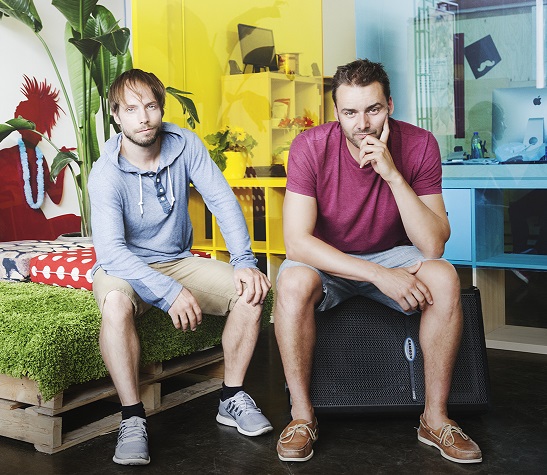
Back in 2012, Félix was working on a freelance project to create giant marionettes for the Just for Laughs Festival in Montréal. He was specializing in technical design for entertainment performances at the time, and a former professor introduced him to David, an engineer, to help him bring the project to life. In just a few hours, the magic happened: “I believed that it would take four days to do and it took four hours! It was just amazing! After that first meeting, I said to David, ‘We should always work together, it’s magical what just happened!’” The next day, David suggested that we start a proper business and one week later, the two signed a five-year lease on a studio.
It was there that they created Dix au carré, a research and development laboratory specializing in creative design projects. In their 4,500 square foot Montreal studio, Félix, David and their three-person team work to develop unique projects that mix creative artistry and technical performance. Felix can’t hide his passion for the projects they create: “We created a guillotine for Ubisoft in Toronto, a piano that paints for an artist in Qatar. When we bring these little dreams to life for people we almost forget all the effort and the sacrificing it took to make them a reality.”
They speak about their projects with an enthusiasm equaled only by their passion for collaboration. “A fusion between two designers” is how Félix and David describe the creation of Dix au carré. The way their different skills perfectly complement one another is the secret to this chemistry. They share passion for performance art, but have quite different backgrounds. Félix’s background in design and user experience, coupled with David’s engineering and modeling expertise, come together to bring clients’ creative visions to life. The contrast between what each contributes is visible right away: “We each have 2,000 square feet. On David’s side are machines, dust, callipers, equipment everywhere, and when you go down there are coloured plexi panels, I have a piano, a foosball table, sculptures… I have a Mac, David has a PC,” jokes Félix. The way in which the two entrepreneurs draw from their own expertise is the essence of Dix au carré, which is not surprising when you consider the name of their business: “D for Design, I for Ingénierie (engineering) and X for the meeting of two ways of thinking: art and science,” explain David and Félix.
Today, the goal for the two co-founders is finding good employees to support the growth of Dix au carré, while maintaining their unique connection, the “small miracle” as they call it, within their team. Recruiting new collaborators for the startup also brings new responsibilities and the loss of certain freedoms. Félix explains: “Being an entrepreneur in the startup phase has a stunning effect because your dream is too big for you to do it alone, so you need people, and then you have to keep things moving because it’s not only your advancement you have to think about. People wait for things from you and you wait for things from them.” Creating and running a business requires a lot of energy, but the result is worth it according to Félix: “Entrepreneurship is about guiding, but mostly it’s about investing huge efforts each day to get a bit closer to your dream. The real salary for an entrepreneur is the sense of accomplishment. When it’s done with passion, entrepreneurship is the best trade.”
——-
Find more information on Dix au carré and its founders here. Read news on their website, their Facebook page and discover some examples of their projects on Vimeo.
Written by : Claire Gendron, Marketing Content Coordinator, Futurpreneur Canada
SweetSeat Spotlight: How This Entrepreneur Grew His Business with the Spin Master Innovation Fund
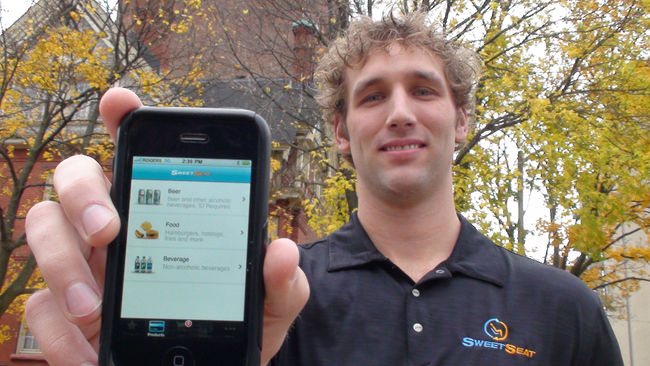
Photo Credit: Ottawa Sun
With the growth in technology usage and advancements, we are seeing a demand for entrepreneurs that are willing to forge a new path of innovation that disrupts the industry and changes the playing field. Young innovators are making an impact on how we function as a society, and improving our lives by developing innovative outside-of-the-box businesses that solve real world problems. Take Ontario entrepreneur, Ryan MacGregor for example. In 2011 he developed an idea that would change the fan experience at sporting and large-scale events with SweetSeat.
While bartending at Scotiabank Place for the Ottawa Senators games, entrepreneur, Ryan MacGregor would constantly have friends texting him food and drink orders to avoid having to wait in long lines and miss the game. As time went on, his friends that were constantly texting him orders, soon turned into his friends of friends that he didn’t even know. It was obvious there was a hole in the industry that needed to be filled, and that is where the idea for SweetSeat came to be.
SweetSeat is a mobile application that provides in-seat merchandise and concession ordering to venues. This enables fans to catch all the action at the event they are attending, and still enjoy all the food and beverages they want at the convenience of their smartphone. Once fans order their merchandise or food and beverages on the app, it will be delivered right to their seat, ensuring that they don’t miss any part of the game or event they are attending, and avoiding having to wait in long lines.
When Ryan first came up with the idea, he started researching mobile ordering and began polling fans coming through the restaurant to see if it was a viable solution. Ryan found that nobody was doing this already, and there was a noticeable demand from fans attending games and events in Ottawa. From this, SweetSeat was born.
Like many budding entrepreneurs, Ryan needed a place to start and funding to help him get his idea off the ground. While looking for potential partners or funding opportunities, he came across the Spin Master Innovation Fund which seemed like the perfect fit to not only help with financing, but also provide him with access to a wide range of networks. “We were a green company when we were starting out, so gaining valuable insight into how to run a business and what it takes to grow a business were integral pieces to our survival,” MacGregor shared. “The Spin Master element also intrigued us in the beginning given their initial growth story and their international expansion, which made us excited to understand how that could aid our development and growth moving forward.”
The Spin Master Innovation Fund provides successful entrants with up to $50k in start-up financing, mentoring with a Futurpreneur Canada mentor and an opportunity to meet Spin Master executives. Successful entrants also receive a trip to Toronto to attend a two-day Innovation Launch Pad Workshop, and another trip to Toronto to attend a two-day Accelerator Workshop.
“The Launch Pad Workshop was an intensive run through of all the different aspects of a strategically structured international business,” explained Ryan. “Meeting with the different business executives was an excellent crash course into the many different hats we were about to wear as entrepreneur.”
Ryan never gave much thought to becoming an entrepreneur so when he started SweetSeat, he truly looked for every reason not to become one. For the first four months he did a lot of research and tried to shoot as many holes into the idea as he could, but everyone surrounding Ryan and his team thought that his idea was a great one, and were jealous they hadn’t thought of it first! Even with the positive feedback, it was still a very nerve-wracking task to take on. Ryan explained the night that he decided to jump in with both feet and move forward with his big idea. “Sitting on the couch with my phone, I thought, in ten years, do I really want to be sitting at a game, placing an order from my phone via someone else’s service, and say to the guy next to me, you know I thought of this first? The answer was blatantly, no.”
In just four years, SweetSeat has seen tremendous growth. They have made use of the networking sessions they attended through the Spin Master Innovation Fund and formed valuable partnerships that have led them to exciting opportunities, and the development of over 15 jobs. “The key tool that is accessible through the Spin Master Innovation Fund is the mentoring and meetings that are held with a myriad of business minds that give each recipient insight into all of the questions they haven’t yet learned to ask,” Ryan stated. “
Interested in being a part of the next Spin Master Innovation Fund cohort? Applications are now open until June 19th, 2015. Learn more and apply here.
Read Ryan’s full success story here.
Read more Spin Master Innovation Fund alumnus stories here.
Written by: Lauren Marinigh, Social Media and Content Creation Coordinator, Futurpreneur Canada


